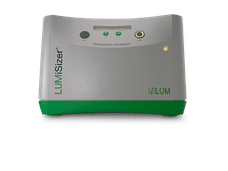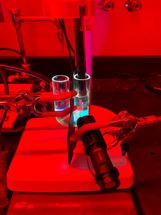New centrifuge technology will enable multi-sample adhesive and composite strength testing
A new analytical centrifuge is being used to test adhesive bonds, coatings and composites. BAM Federal Institute for Materials Research and Testing’s scientists had the idea that samples should no longer be clamped, but simply inserted. Simply inserting the specimen makes rapid loading possible. In addition, up to eight samples can be tested simultaneously under identical conditions. Conventional tensile testing machines were and still are only able to test one (clamped) specimen at a time. BAM researchers registered their functional principle with the patent office as early as 2004. Since then, Berlin based LUM GmbH licensed the principle and has developed a market-ready product.
The result is a time saving of about 85 percent. When the bond fails, the time, current rotational speed and the affected sample location are automatically sent to a computer from the running centrifuge. Specially developed software calculates the critical forces and tensile stresses and presents the results.
At first glance, the new test system looks like a traditional bench-top centrifuge. But inside there is a special rotor which runs at up to 13,000 revolutions per minute developed by LUM GmbH. Using test stamps which are glued or otherwise attached to the test specimen, adhesive bonds, coatings and composites are subjected to tensile forces. As in a carousel, the centrifugal force resulting from the rotary movement is used. Acceleration up to 10,000 g can be achieved, resulting in centrifugal forces of up to 6.5 kilo Newton (kN) acting on the sample. By comparison, normal gravity is 1g.
"Because of the range of test loads from 0.1 N to 6.5 kN, almost any type of test procedure for both short-term and long-term stress-fatigue tests can be programmed", says Prof. Dietmar Lerche, Managing Director LUM GmbH, Berlin, which specialises in analytical centrifuges. BAM’s Division Head Uwe Beck adds: "The fully automated bench-top testing system is of equal interest to both research and development and industrial quality assurance." The diameter of the test surface can be up to 10 millimetres (mm), the maximum sample sizes are currently at 30 mm x 30 mm x 15 mm. Tensile strength can be tested up to 82.5 N/mm².
Other news from the department research and development
These products might interest you

LUMiSizer by LUM
The Versatile Particle and Dispersion Analyser: At-Line, in the Process and in the Laboratory
Comprehensive analysis of nano / microparticles & their interactions in dispersions with 1 instrument

OHAUS Laboratory equipment by Ohaus
Do More with OHAUS Laboratory Equipment
Do Not Limit Yourself to Just Measurement! Discover Ingenious Portfolio

Get the chemical industry in your inbox
By submitting this form you agree that LUMITOS AG will send you the newsletter(s) selected above by email. Your data will not be passed on to third parties. Your data will be stored and processed in accordance with our data protection regulations. LUMITOS may contact you by email for the purpose of advertising or market and opinion surveys. You can revoke your consent at any time without giving reasons to LUMITOS AG, Ernst-Augustin-Str. 2, 12489 Berlin, Germany or by e-mail at revoke@lumitos.com with effect for the future. In addition, each email contains a link to unsubscribe from the corresponding newsletter.




























































